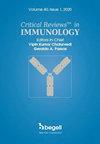Function of steroid receptor coactivators (SRCs) in T cells and cancers: Implications for cancer immunotherapy
IF 0.9
4区 医学
Q4 IMMUNOLOGY
引用次数: 0
Abstract
Steroid receptor coactivator (SRC) family members (SRC1, SRC2 and SRC3) are transcriptional co-regulators. SRCs orchestrate gene transcription by inducing transactivation of nuclear receptors and other transcription factors. Overexpression of SRCs is widely implicated in a range of cancers, especially hormone-related cancers. As coactivators, SRCs regulate multiple metabolic pathways involved in tumor growth, invasion, metastasis, and chemo-resistance. Emerging evidence in recent years suggest that SRCs also regulate maturation, differentiation, and cytotoxicity of T cells by controlling metabolic activities. In this review, we summarize the current understanding of the function of SRCs in T cells as well as cancer cells. Importantly, the controversies of targeting SRCs for cancer immunotherapy as well as possible reconciliation strategies are also discussed.类固醇受体辅激活剂 (SRC) 在 T 细胞和癌症中的功能:癌症免疫疗法的意义
类固醇受体辅激活因子(SRC)家族成员(SRC1、SRC2 和 SRC3)是转录协同调控因子。SRC 通过诱导核受体和其他转录因子的转录激活来协调基因转录。SRCs的过度表达与一系列癌症,尤其是与激素相关的癌症有广泛联系。作为辅助激活因子,SRCs 可调节涉及肿瘤生长、侵袭、转移和化疗抗性的多种代谢途径。近年来新出现的证据表明,SRCs 还能通过控制代谢活动来调节 T 细胞的成熟、分化和细胞毒性。在这篇综述中,我们总结了目前对 SRCs 在 T 细胞和癌细胞中功能的理解。重要的是,我们还讨论了针对 SRCs 进行癌症免疫疗法的争议以及可能的调和策略。
本文章由计算机程序翻译,如有差异,请以英文原文为准。
求助全文
约1分钟内获得全文
求助全文
来源期刊
CiteScore
2.60
自引率
0.00%
发文量
14
审稿时长
>12 weeks
期刊介绍:
Immunology covers a broad spectrum of investigations at the genes, molecular, cellular, organ and system levels to reveal defense mechanisms against pathogens as well as protection against tumors and autoimmune diseases. The great advances in immunology in recent years make this field one of the most dynamic and rapidly growing in medical sciences. Critical ReviewsTM in Immunology (CRI) seeks to present a balanced overview of contemporary adaptive and innate immune responses related to autoimmunity, tumor, microbe, transplantation, neuroimmunology, immune regulation and immunotherapy from basic to translational aspects in health and disease. The articles that appear in CRI are mostly obtained by invitations to active investigators. But the journal will also consider proposals from the scientific community. Interested investigators should send their inquiries to the editor before submitting a manuscript.

 求助内容:
求助内容: 应助结果提醒方式:
应助结果提醒方式:


